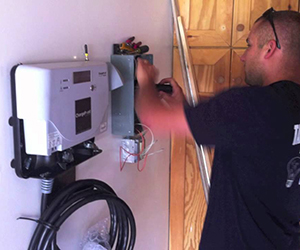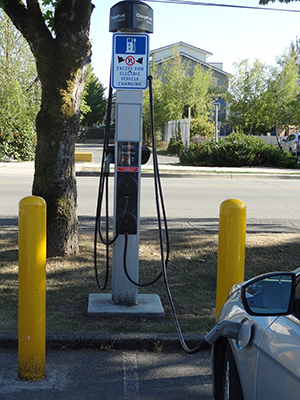We are electric vehicle drivers in Richmond offering information for drivers interested in switching to an electric vehicle as a primary or secondary vehicle. Richmond has an ideal environment for electric vehicles, but they do not necessarily meet everyone's needs. For those interested in reducing their household's direct greenhouse gas emissions, switching to an electric vehicle has by far the greatest impact. While environmental concerns are often a factor in the decision to switch to an electric vehicle, the main reason is usually the sheer fun of the electric driving experience.
About Us Detailed InformationWe have been asked to provide information on which electric vehicle models are manufactured in the United States to assist those who wish to avoid purchasing those models in the current political climate. That information is provided on our Vehicles Page here.
Richmond does not get very hot or cold, both of which reduce battery performance. Richmond is also very flat so battery range is not reduced by the extra power needed to climb steep hills. Richmond's electricity is generated by hydro power so there are no fossil fuels being burned to charge the vehicle. Gas engine vehicle use accounts for 44.6% of household greenhouse gas emissions compared to 16.6% for space heating and cooling and 8% for water heating.
There is a list here of vehicles which have a minimum range of 150 km.
The first step is to determine the maximum range that you need in an electric vehicle to feel comfortable. For Richmond owners, an electric range of 80 km allows for more than two return trips to downtown Vancouver in one day plus an extra margin for safety. For longer trips, we recommend 365 km of range for two hours of highway driving and 525 km for three hours. There is a detailed discussion of range requirements to particular destinations here.

You can charge your vehicle using a standard 120V electrical outlet (level 1 charging), but it will take forever. Most owners install a 240V outlet (level 2) in their garage or carport which is similar to installing an outlet for an electric clothes dryer. Tesla vehicles, the Nissan Leaf PLUS and Audi e-tron can plug directly into the outlet. Other vehicles require a charging station (EVSE) that plugs into the outlet and connects to the vehicle. It is important to verify that there is sufficient power available in the home. Most electric vehicles can be programmed to charge in the middle of the night when demand on the electric grid is very low making surplus power available.
Manufacturers are developing the ability to update vehicle software and firmware by transmitting updates over the air rather than requiring that the vehicle be brought to a service centre. Vehicle owners are required to provide connectivity to a high bandwidth home WiFi network.
The distance from Richmond Centre to Canada Place in downtown Vancouver is 16 km. Two return trips downtown in one day with an extra margin for safety would be 80 km, well within the range of the electric vehicles listed here. For longer trips, we recommend 365 km of range for two hours of highway driving and 525 km for three hours.

EV charging station at the Steveston Community Centre
In the 80 km per day scenario, you don't need to find a charging station. Most electric vehicle drivers charge their vehicles overnight at their residence and rarely use public charging stations. When one is needed, there are over 90 public charging stations in Vancouver and another 25 in Richmond.
Yes, the luxury electric vehicles are very expensive for the average budget, but there are plenty of affordable alternatives with a range of 300 km or more. Most of the alternatives are eligible for both a Federal Government rebate of $5,000 and an additional BC Government rebate to a maximum of $4,000. (Both Federal and BC rebates are being paused until further notice) Details here.
There is information on used electric vehicles on our Used Vehicles page.
There is information here on an agency that rents electric vehicles in Richmond. Plug-in Richmond members get a 5% discount.
Although hydrogen fuel vehicles are zero emission, most hydrogen production is not. Natural gas reforming produces hydrogen using high temperature steam which usually involves greenhouse gas emissions. Electrolysis produces hydrogen using electricity which wastes electricity compared to putting the electricity directly into the vehicle battery.
It takes less time to refuel using hydrogen which may make it more attractive for trucks and commercial vehicles.

The new Dodge Charger Daytona is the only electric passenger vehicle assembled in Canada.
While used electric vehicles going back to 2011 are available, the cost/benefit sweet spot is 2015 - 2017 models in the $20,000 - $25,000 range, particularly the Nissan Leaf, Kia Soul EV and BMW i3.
More electric pickups and cargo vans are arriving in 2025.
The BC Government is now issuing a special sticker for electric vehicles that permits use of the HOV lane even if the only occupant is the driver. The details are available on the BC Government website here. The application form can be downloaded here.

The higher purchase cost of an electric vehicle can be recovered in as little as 4 years due to the much lower operating cost which comes from both the lower cost of electricity compared to gas and the lower maintenance cost due to the far lesser number of moving parts and fluids.
Battery replacement is rare. Batteries in the newest models are expected to last the life of the vehicle. A typical new electric vehicle warranty guarantees that the battery's capacity will not drop below 70% in the first 8 years or 160,000 km. In the unlikely event of battery replacement, the cost is offset by the considerable savings on maintenance over the life of the vehicle.